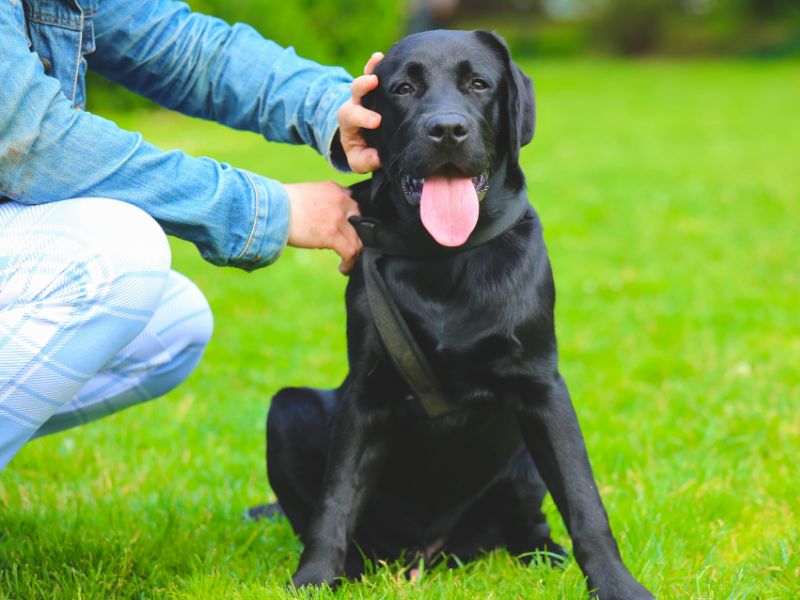Labrador Retrievers are one of the most popular dog breeds in the world. They are known for their friendly and gentle nature, making them a great family pet. However, many people wonder if Labradors are protective of their owners and households.
Labradors are not typically considered temperamentally protective in the same way that traditionally defensive dog breeds are. They may try to protect their household from things they view as a threat. But to the open-hearted Lab, not many encounters fall into the category of threatening. According to The Labrador Site, Labs have an instinct to protect their family members and will go to great lengths to ensure everyone is safe.
While Labradors are not known for their aggression, they will often alert their owners if there is a perceived threat. However, their friendly and gentle nature makes them more inclined to be welcoming to strangers rather than exhibiting aggressive behavior. According to Dogdorable, Labradors are naturally protective of their families, although they are generally not aggressive.
What Do We Mean By Protective
When we talk about whether Labradors are protective, we are referring to their ability to defend their owners and territory against perceived threats. Protective behavior can manifest in different ways, such as barking, growling, or even physically intervening to protect their owners. However, it’s important to note that not all Labradors possess natural protective instincts, and some may be more inclined to be friendly towards strangers than to exhibit aggressive behavior.
Labrador protection training can help to develop and harness their protective instincts, but it’s important to approach this training with caution and under the guidance of a professional trainer. Overly aggressive behavior can be dangerous and may result in legal consequences for the owner.
It’s also worth noting that Labradors are not typically guard dogs, and their protective behavior may not be as intense or aggressive as that of breeds specifically bred for guarding and protection. However, their loyalty and devotion to their owners can make them excellent companions and family pets, and their protective behavior can provide an added sense of security in the home.
Are All Dogs Protective
Dogs are known for their loyalty and love towards their owners. They are often considered as a member of the family and provide companionship, entertainment, and protection. However, not all dogs are protective. Some dogs are bred for specific purposes, such as hunting or herding, and do not have the instinct to protect their owners.
The level of protectiveness in dogs also depends on their individual personalities. Some dogs are naturally more protective than others, while some are more laid-back and friendly. For example, Labrador Retrievers are known for their friendly and gentle nature, which makes them more inclined to be welcoming to strangers rather than exhibiting aggressive behavior.
It is also important to note that the level of protectiveness in dogs can be influenced by their upbringing and training. Dogs that are socialized and trained from a young age are more likely to be confident and well-behaved, which can make them better protectors. On the other hand, dogs that are not properly socialized or trained may exhibit aggressive behavior towards strangers or even their owners.
In conclusion, while dogs are often viewed as protectors, not all dogs are protective. The level of protectiveness in dogs depends on their breed, individual personality, and upbringing. It is important to understand these factors when choosing a dog as a pet and to provide them with proper socialization and training to ensure their behavior is appropriate.
Protection Vs Possession
Labrador Retrievers are known for their loyalty and affection towards their owners. They are often considered to be protective dogs because of their size and strength. However, it is important to distinguish between protection and possession.
Protection is when a dog takes action to defend their owner or their property against a perceived threat. Possession, on the other hand, is when a dog becomes possessive of their owner or their property and becomes aggressive towards anyone who approaches.
Labradors are generally not possessive dogs. They are friendly and social animals that enjoy being around people and other dogs. However, they may become protective if they sense a threat. It is important to socialize your Labrador from a young age to prevent possessive behavior.
One way to prevent possessive behavior is to establish clear boundaries and rules for your dog. This can include teaching them to respect personal space and not to jump on people. It is also important to provide your dog with plenty of exercise and mental stimulation to prevent boredom and frustration.
In summary, Labrador Retrievers can be protective dogs, but it is important to distinguish between protection and possession. With proper training and socialization, your Labrador can be a loyal and affectionate companion that will protect you when needed.
Do Labradors Protect Their Owners
Labradors are known for their friendly and outgoing nature, which is why they are one of the most popular dog breeds in the world. However, many people wonder if Labradors are protective of their owners. The answer is yes, but to a certain extent.
Labradors are not bred specifically for protection or guarding, but they do form strong bonds with their owners. They are loyal and loving animals and will do anything to protect their family. They have a natural instinct to protect their owners from danger, but they are not aggressive dogs by nature.
Labradors may try to protect their household from things they view as a threat. However, they are not typically considered temperamentally protective in the same way that traditionally defensive dog breeds are. This means that they may not be as willing to defend their owners as some other breeds.
In summary, while Labradors are not bred for protection, they do have a natural instinct to protect their owners. They are loyal and loving animals that will do anything to keep their family safe. However, their protective nature may not be as strong as some other breeds, and they may not be as willing to defend their owners in certain situations.
Get Pippa’s Training Tips
Pippa Mattinson is a best-selling author and dog training expert who has written extensively on Labrador Retrievers. Her website, The Labrador Site, offers a wealth of information on the breed, including training tips.
One of Pippa’s top training tips is to start early. Labrador Retrievers are known for their intelligence and trainability, but it’s important to start training them as puppies. This includes basic obedience commands such as sit, stay, and come, as well as socialization with other dogs and people.
Another important aspect of training is positive reinforcement. Pippa recommends using treats and praise to reward good behavior, rather than punishment for bad behavior. This helps to build a strong bond between the dog and owner, and encourages the dog to repeat desirable behaviors.
Consistency is also key when it comes to training. Pippa advises setting clear rules and boundaries for the dog, and sticking to them. This helps to establish a routine and structure for the dog, which can lead to better behavior overall.
Overall, Pippa’s training tips focus on building a positive and rewarding relationship between the dog and owner. By starting early, using positive reinforcement, and being consistent, owners can help their Labrador Retriever become a well-behaved and loyal companion.
How Protective Aggression Works
Labrador Retrievers are generally friendly and gentle dogs. However, they are capable of exhibiting protective aggression when they sense a perceived threat or danger to their family or territory. Protective aggression is a natural instinct in dogs, and it can be seen in any breed, including Labradors.
When a Labrador senses a threat, they may display a range of behaviors, including growling, barking, and even biting. These behaviors are designed to warn the perceived threat and protect their family or territory. However, not all Labradors possess natural protective instincts, and some may require training to exhibit protective aggression.
It’s important to distinguish between protective aggression and other forms of aggression, such as fear or territorial aggression. Territorial aggression occurs when Labradors become overly protective of their living space, while fear aggression is rooted in anxiety and insecurity. Protective aggression is a specific type of aggression that is triggered by a perceived threat to the dog’s family or territory.
Labrador owners should be aware of the signs of protective aggression and take steps to manage and train their dogs accordingly. A professional dog trainer experienced in protection work can help tailor the training process to the Labrador’s individual needs and temperament. With proper training and management, Labradors can exhibit protective aggression while still maintaining their friendly and gentle nature.
Can You Train A Lab To Be Protective
Labrador Retrievers are known for their friendly and outgoing nature. They are not typically considered temperamentally protective in the same way that traditionally defensive dog breeds are. However, with proper training and socialization, Labs can learn to be protective of their owners and households.
One way to train a Lab to be protective is through obedience training. Teaching a Lab to follow basic commands such as “sit,” “stay,” and “come” can help establish a bond between the dog and the owner. This bond can then be used to teach the dog to protect the owner and household.
Another method is to expose the Lab to various social situations and environments. This can help the dog become more confident and aware of their surroundings. It can also help the dog learn to differentiate between normal and threatening situations.
It’s important to note that while Labs can be trained to be protective, they are not naturally aggressive or territorial like some other breeds. Therefore, it’s essential to use positive reinforcement techniques and avoid punishment-based training methods.
In summary, while Labs are not typically considered protective, they can be trained to be so with proper training and socialization. Obedience training and exposure to various social situations can help establish a bond between the dog and owner, and teach the dog to protect their household.
Will Labs Attack Intruders
Labrador Retrievers are known for being friendly and loyal dogs. However, when it comes to protecting their families, Labs can be quite effective. While they may not be the best guard dogs, they are still capable of defending their owners if necessary.
Labs are not typically aggressive dogs, but they do have a protective instinct that can be activated if they feel their family is in danger. If an intruder enters the home, a Lab may respond aggressively to protect their family. However, this is more likely to happen if the intruder shows aggression or malicious intent towards the dog or the family.
It’s important to note that not all Labs have the same temperament or personality type. Some Labs may be more aggressive than others when faced with an intruder, while others may be more passive. It’s also important to remember that Labs are not trained guard dogs, so they may not always respond in the way their owners expect.
Overall, while Labs may not be the first breed that comes to mind when thinking of guard dogs, they are still capable of protecting their families if necessary. Owners should be aware of their dog’s temperament and personality and take steps to ensure their safety in case of an intruder.
Are Labradors Loyal
Labradors are known for their friendly and affectionate nature towards their owners and family members. They are highly social dogs that thrive on human interaction and love to be around their owners. Labradors are also known for their loyalty towards their owners and their families. They are devoted pets that will do anything to protect their loved ones.
Labradors are intelligent dogs that have a strong desire to please their owners. They are quick learners and respond well to positive reinforcement. Labradors are also known for their high energy levels, which make them great companions for active individuals and families.
Overall, Labradors are loyal and loving dogs that make great pets for families. They are friendly, affectionate, and thrive on human interaction. Their loyalty towards their owners and their families is unmatched, and they will do anything to protect their loved ones.













